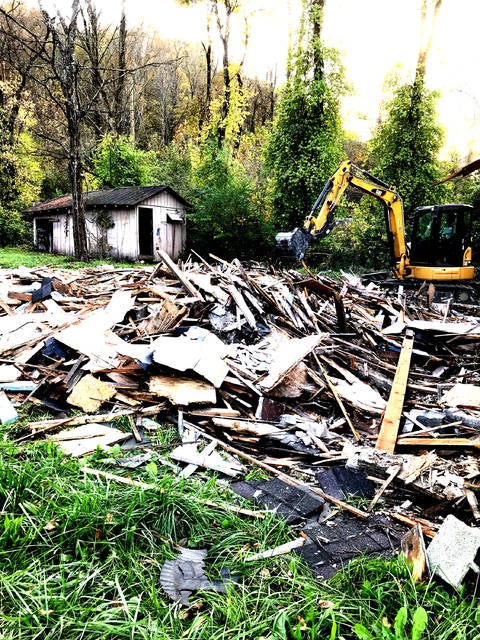Codes Enforcement Board continues making positive changes in Middlesboro
Published 3:54 pm Thursday, November 7, 2019

Photo by Mayor Rick Nelson
The Middlesboro Street Department continues to work hard at demolishing the homes that the Codes Enforcement Board has issued final orders on. Mayor Rick Nelson and Codes Enforcement Officer Tim Kelley explain the process that it takes to get from the first violation to a final order.
It was a year ago when the Edgewood Apartments drew attention to the Middlesboro Codes Enforcement Board. This year, the Codes Enforcement Board is continuing to move in a positive direction.
“We are a lot more organized this year and we are a lot farther along,” Codes Enforcement Officer Tim Kelley said. “We have probably 20 to 25 (houses) that have gone through the process and are ready to be torn down now.”
According to Kelley, prior to this year the homes they were seeing were mostly partial burns or homes that were already falling down.
“This year we have at least 25 homes that have gone through the entire process,” Kelley explained. “Those homes are ready to be torn down.”
According to Kelley, from start to finish the process can last from three months to a year.
“In some cases, it can be three or four months then there are cases that it can be a year to a year and a half,” he said. “If they completely ignore any of our enforcement actions, that gets us to the end result and it will get us to the end result a lot quicker.”
Mayor Rick Nelson said that the homeowners are given the appropriate amount of time to cooperate with the board.
“The board will work with them in any way that we can,” Kelley said. “We are willing to work with them in any way that we can.”
Kelley said that they have seven really good members on the Codes Enforcement Board.
“They are interested in the city and want to see it cleaned up,” he said. “They have complete power over any enforcement action that we produce and then they rule on the validity of those violations.”
“The land owners or the homeowners have the option to come up and plead their cases to the board,” Mayor Nelson said. “They can try to get an extension or at least prove that they are working to correct it.”
Kelley agreed that the land owners or homeowners can ask for additional time, but they have to show some proof that they are cooperating and show diligence that they are trying to abate the violations.
Mayor Nelson discussed the process in which the city collects their money for the time and work put into these properties.
“We just finalized that on the city’s web page,” Kelley said. “It is the lien notification system, and we’ve finally got that into place. We have 13 liens on there for the ones we did last year. I think those totaled between $27 and $28,000 of expenses and fines that have been included on those previous properties that we have completed earlier.”
According to Kelley, the city has two choices.
“Once we record that lien with the (Bell) County Clerk then we can proceed with additional civil action and sue for any debt, or we can leave the lien in place for 10 years and if that property sells we then capture any of that money,” he continued to explain.
Kelley said there is a process in place with agreed order where people can make payments if they want to abate their violations.
“If we have already torn them down, then it’s just a matter of collecting that money,” he said. We can force the sale of the property if we have a judgment against them. Then we can go before the court and ask for that to be sold, but part of the problem with that is if we force that sale then we become the plaintiff in that court action.”
He said if the property doesn’t sale for all the liabilities that are out there, then the city ends up paying those court costs, the cost of the sale, the cost of the appraisals, plus all of the work that they’ve already put into it.
“We could invest more money in the process and collect less money,” Kelley said. “The process now is that if the board levels the fines they are paid straight into the general fund to the city of Middlesboro instead of the district court. It’s a better situation than what we had previously.”
Kelley said that the first step is talk to the land or homeowners. If there is cooperation to fix things, then nothing will come of it. The next step is the violation.
“We give them a certain amount of time then we issue what is called a uniformed code citation,” he said. “Once that is cited, then it goes before the Codes Enforcement Board and the appointed officials hear all the evidence and they replace the district judge and they can issue findings of fact. If there is still nothing done after the citation, then it goes to what is called the final order.”
He said that is when it is signed off by the chairman of the board and the secretary, and they are then delivered to the land or homeowners and the fines begin.
“We give them that schedule of fines and each step tells them what they may be liable for at some point in time,” Kelley explained.






